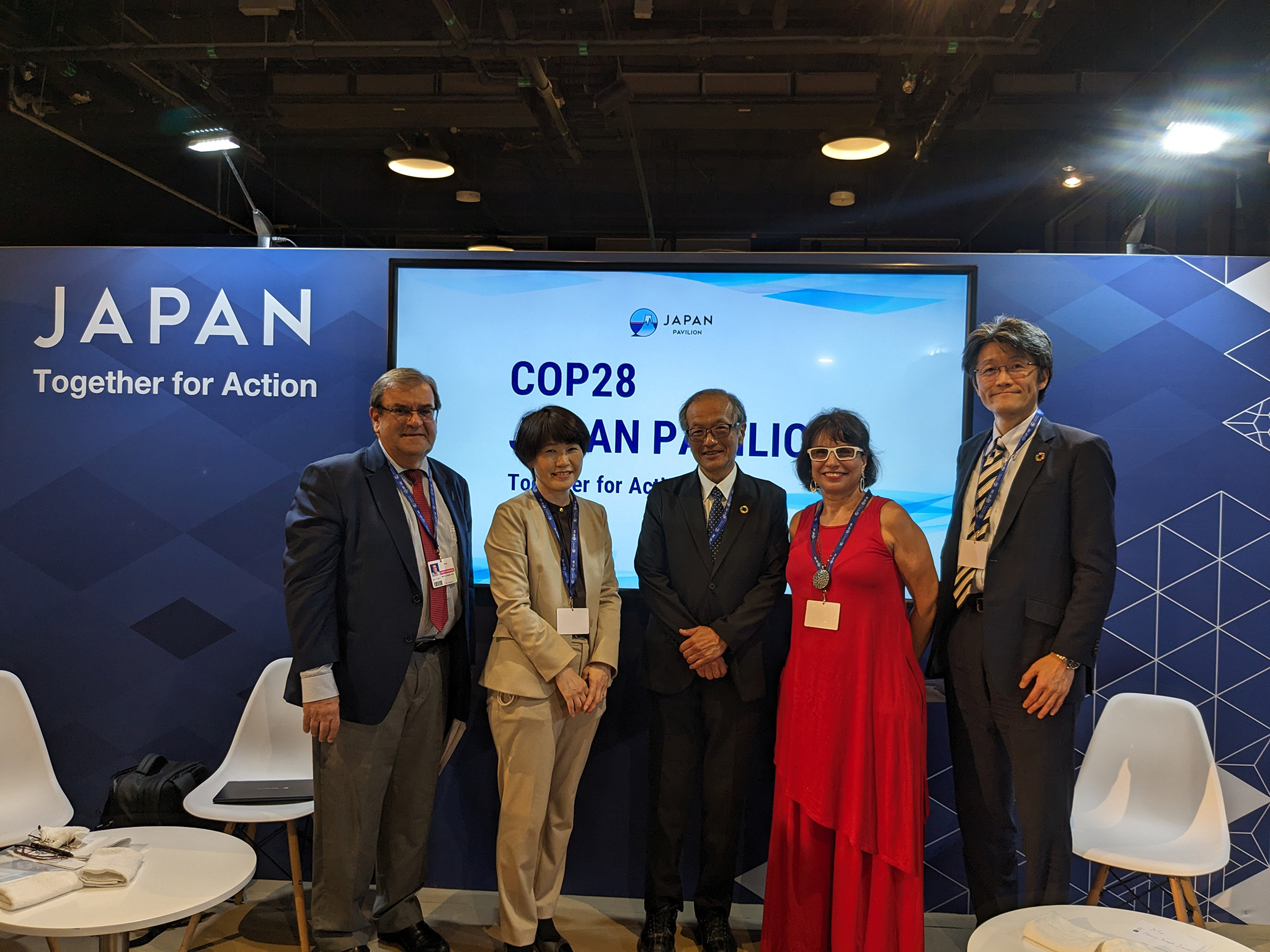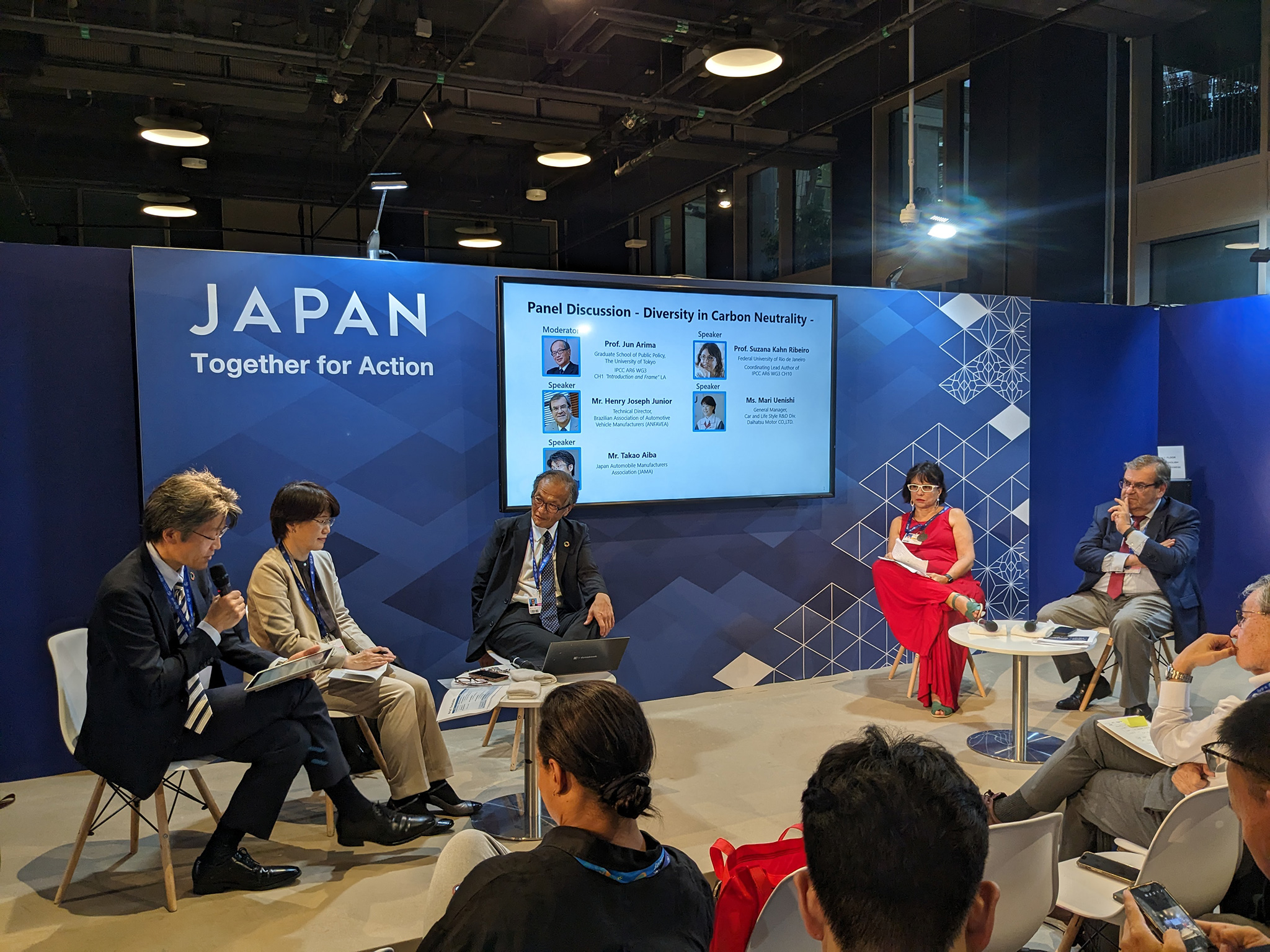JAMA's Side Event at COP28 (December 2023)
1. Seminar Abstract
December 6, 2023, at the COP28 venue in Dubai, UAE - A side event titled “Diversity in Carbon Neutrality” was held at the Japan Pavilion, hosted by the Japan Automobile Manufacturers Association.
With the participation of leading authors for the Intergovernmental Panel on Climate Change, the world’s authoritative body on pertinent scientific knowledge, as well as a representative of Brazil’s motor vehicle manufacturers association and an expert from Daihatsu Motor Co., the discussion focused on the need for diverse pathways to carbon neutrality in the road transport sector, covering the life cycle of vehicles, advances in technology, and local biomass resource utilization.
【Speakers】
- Jun Arima
Project Professor*, Graduate School of Public Policy, University of Tokyo
Leading author of IPCC AR6 WG3 Chapter 1, “Introduction and Framing”
*Moderator - Suzana Kahn Ribeiro
Professor, Federal University of Rio de Janeiro
Coordinating Lead author of IPCC AR6 WG3 Chapter 10, “Transport” - Henry Joseph, Jr.
Technical Director, Brazilian Association of Automotive Vehicle Manufacturers (ANFAVEA) - Mari Uenishi
General Manager, BR Bio Project Dept, Daihatsu Motor Co., Ltd. - Takao Aiba
Chairperson, International Climate Change Policy Expert Group, Japan Automobile Manufacturers Association (JAMA)
2. Summary of Speaker Presentations

- Recognizing the slow progress on implementation of the [UN] Sustainable Development Goals by 2030, JAMA has a sense of urgency and is making maximum efforts towards carbon neutrality.
- The importance of the “range of pathways” and “multi-pathway approaches” to achieving carbon neutrality has been recognized not only in the latest IPCC report, but also by the G7 leaders and the G7 national automobile manufacturers associations.
- Over the past 20 years, Japan has achieved a -23% reduction in CO2 emissions in the road transport sector through the pursuit of various options including the diffusion of HEVs and kei (mini) cars, ranking it among the top G7 countries in terms of carbon emission reductions.
- Steady progress is being made in the implementation of the variety of options (technologies/strategies) that can be adopted to reduce CO2 emissions in road transport, as demonstrated by JAMA’s exhibit of different types of vehicles at the G7 Hiroshima Summit.
- Addressing climate change requires collective efforts among all stakeholders in order to reduce CO2 emissions as rapidly and as significantly as possible. To achieve that goal, it is important to respect regional diversity and to recognize that flexibility through the adoption of multiple, technology-open pathways is necessary. Genuine enthusiasm by determination supported by action can change the future.

- To help promote the creation of sustainable communities, a project has been launched in a regional area of Japan that involves rice farmers, Omi cattle farmers, vehicle manufacturers and government and targets the local production and consumption of biomass resources.
- Because there are diverse pathways to carbon neutrality, solutions should be found on the basis of their suitability to a particular community.
- Members of a community can join forces to achieve carbon neutrality and the sustainability of their community. This case has applicability in many regions of the world and can contribute to the achievement of multiple sustainable development goals.
- Action on the biomass-to-biogas project could be taken immediately because implementation was possible using existing facilities.

- Conducting life cycle analysis is critical to achieving real, significant carbon reduction. There are differences in regional situations.
- More specifically, there are various options depending on national and local conditions. A good solution in one region may not be appropriate in another. Good and bad powertrain combinations depend on the country.
- The pursuit of sustainability should take into account factors such as accessibility and equity, costs, and partnerships.
- Biofuel technology is mature and some countries already have the technology. However, without tools and strategies in addition to the technology, such options cannot be used. Education, changes in behavior and R&D are also important.
- In Brazil, the focus is on bioenergy because of the abundance of biomass.
- Advancing the commercialization of breakthrough technologies is essential to expanding their potential and thereby accelerating the transition to decarbonization. BEVs, HEVs, biomass and bioethanol-powered vehicles will contribute to that goal.

- There are two technological pathways to reducing or eliminating CO2 emissions from vehicles: conversion to EVs and the use of biofuels.
- Brazil is blessed with a high proportion of clean and renewable energy production. Almost half of its energy comes from renewable sources such as hydropower, solar, wind, biomass, and firewood. To take advantage of this situation, Brazil is decarbonizing through the well-to-wheel concept.
- Flex-fuel vehicles, which can run on either petrol or bioethanol, are available in Brazil and have been well received by customers. Flex-fuel HEVs are also available and are best sellers.

Prof. Arima
As summary of session:
- Our guest speakers today have explained the significance of the JAMA exhibit held at the G7 Hiroshima Summit; the content of the joint statement on achieving carbon neutrality issued by G7 national automobile manufacturers associations; specific initiatives in Japan and Brazil; and scientific findings of the IPCC.
- The key word in this session was “diversity.” Individual regions face different situations and priorities. The importance of diversity and a multiple-pathway approach needs to be recognized.
- It is necessary to move from the “ambition” phase to the implementation phase by taking action now.
- There are many challenges and realities involved in reducing emissions. The support of all stakeholders is essential to achieving a transition that is equitable. This applies not only to biomass, but also to renewable energies such as wind and solar.
- Worldwide, we are at a critical point and action can no longer be deferred. The transport sector is of crucial importance to achieving the common goal of carbon neutrality.
Event Archive
3. Session summary
The session emphasized the message shared at the G7 Hiroshima Summit on the importance of respecting national and regional diversity and adopting a technology-open and multiple-pathway approach to achieving the goal of carbon neutrality by 2050. Speaking to an attentive audience, session participants included leading-figure panelists from Brazil, host of the G20 Summit in 2024 and COP30 in 2025.


▼you can find the reports of JAMA's side event at COP27 (Nov. 2022) here
AR6 |
Sixth Assessment Report |
|---|---|
BAU |
Business As Usual |
BECCS |
Bioenergy with Carbon Capture and Storage |
BEV |
Battery Electric Vehicle |
CLA |
Coordinating Lead Author |
CDR |
Carbon Dioxide Removal |
CN |
Carbon Neutral |
DACCS |
Direct Air Carbon dioxide Capture and Storage |
GHG |
Greenhouse Gas |
JAMA |
Japan Automobile Manufacturers Association |
ICEV |
Internal Combustion Engine Vehicle |
IEA |
International Energy Agency |
IPCC |
Intergovernmental Panel on Climate Change |
LA |
Lead Author |
NZE |
Net Zero Emissions by 2050 |
OICA |
Organisation Internationale des Constructeurs d'Automobiles |
SDGs |
Sustainable Development Goals |
WG3 |
Working Group 3 |

